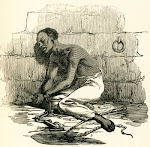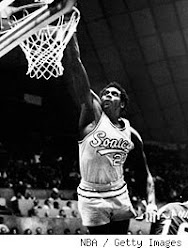 "Now you see them, now you don't."
"Now you see them, now you don't."Illusionists, such as David Copperfield, Criss Angel, and others, have thrilled us for years with their uncanny feats of magic, making objects disappear that defy logic and commonsense--in the case of Copperfield, the Statue of Liberty. But compared to the disappearing act yet to come, these illusionists have nothing on Life's greatest illusionist, Father Time.
For all of Father Time's illusionist skills, the Disappearing Act won't take place all at once, engulfed within a large cloud of gray smoke for effect, but gradually over a few decades--actually around A.D. 2041, says the Census Bureau.
At that time, this nation's white majority will have disappeared, and, for the first time in a long time, assume a minority status.
And not everyone is pleased with this Disappearing Act, and not everyone is clapping and cheering for what Father Time is about to wrought, chief among them, Patrick J. Buchanan, Republican.
To show his displeasure, Buchanan wrote a review of the coming A.D. 2041 event, writing it long before the event (the disappearing act) has had a chance to crystallize in the record books, and long before it has had a chance to register in the hearts and minds of the Americans of that day.
Back in June of this year, I advanced a thesis--one that I knew would require a book-length treatment if I were to substantiate my position--in the comment section of my blog. I'm going restate it here, and ask that you take a bite of it, roll it around on your tongue, and tell me if it has the taste of authenticity.
But before I do that, let's read a little from Buchanan's review on the Disappearing Act facing white America--an eventuality which Buchanan is now dreading, despite the prediction that it will occur years in the future. He titles his observations simply, .A.D. 2041 -- End of White America?
"John Hope Franklin, the famed black historian at Duke University, once told the incoming freshmen, "The new America in the 21st century will be primarily non-white, a place George Washington would not recognize."
In his June 1998 commencement address at Portland State, President Clinton affirmed it: "In a little more than 50 years, there will be no majority race in the United States." The graduates cheered.
The Census Bureau has now fixed at 2041 the year when whites become a minority in a country where the Founding Fathers had restricted citizenship to "free white persons" of "good moral character."
With publication today of "Suicide of a Superpower: Will America Survive to 2025?" this writer takes up what this portends. And while many on the left are enthusiastic about relegating the America of Eisenhower and JFK to a reactionary past, I concur with the late Clare Boothe Luce.
In this world, she said, there are optimists and pessimists.
"The pessimists are better informed."
Clever statement from Pat, sounding the alarm, but what, if anything, can be done to offset the inevitability of the white Disappearing Act? You'd think not much, given the coming population shift, and the ensuing "Incredible Shrinking White Population." But then you'd be wrong. That's where my thesis comes in. I've used every skill and my disposal, my intuition, and my reasoning, to reveal a plot to keep power--especially political power--in the hands of whites.
Next, Buchanan prepares his readers for the consequences of a white Disappearing Act, and what it means for our national economic superiority:
First, the end of a national Republican Party that routinely gets 90 percent of its presidential votes from white America.
California is the harbinger of what is to come.
Carried by Richard Nixon in all five presidential elections when he was on the ticket and by Ronald Reagan all four times he ran, California, where whites are now a shrinking minority, is a state where the GOP faces extinction. John McCain's share of the California vote was down to the Barry Goldwater level of 1964.
When Texas, where two-thirds of the newborns and half the schoolchildren are Hispanic, goes the way of California, it is the end for the GOP. Arizona, Colorado and Nevada, also critical to any victorious GOP coalition, are Hispanicizing as rapidly as Texas.
In every presidential election since Bush I in 1992, Hispanics have given 60-70 percent of their votes to the Democratic ticket.
For Hispanics, largely poor and working class, are beneficiaries of a cornucopia of government goods - from free education to food stamps to free health care. Few pay federal income taxes.
Why would they not vote for the Party of Government?
Second, the economic crisis of California, brought on by an outflow of taxpayers and a huge influx of tax consumers - i.e., millions of immigrants, legal and illegal - will be mirrored nationally.
For though the majority of immigrants and illegals comes to work, and work hard, most now come from Third World countries and do not bring the academic or professional skills of European-Americans.
Third, the decline in academic test scores here at home and in international competition is likely to continue, as more and more of the children taking those tests will be African-American and Hispanic. For though we have spent trillions over four decades, we have failed to close the racial gap in education. White and Asian children continue to outscore black and Hispanic children.
Can the test-score gap be closed? With the Hispanic illegitimacy rate at 51 percent and the black rate having risen to 71 percent, how can their children conceivably arrive at school ready to compete?
Should this continue for three decades, what will it mean for America if Asians and whites occupy the knowledge-industry jobs, while scores of millions of black and Hispanic workers are relegated to low-paying service-sector jobs? Will that make for social tranquility?
Affirmative action is one answer. But this is already causing a severe backlash, and the reason is obvious.
When affirmative action was first imposed, whites outnumbered blacks nine to one. The burden of reverse discrimination on the white community was thus relatively light. Today, however, not only blacks, but Hispanics and women - two-thirds of the entire population - qualify for affirmative action in hiring and school admissions.
And the burden falls almost entirely on white males, who are one-third of the country but three-fourths of the dead and wounded coming back from Afghanistan.
No where does Pat mention the Dream Act, which Republicans detest, and its power to close the education gap that he says exists between Latinos and whites. He suggests, further, that the wars in Iraq and Afghanistan have served primarily to reduce a large number of an essential class of whites, specifically white males, upon which this country will someday depend to fill its "knowledge-industry jobs."
For the sake of this country's future, it would have been better, he seems to say, if Latinos and blacks were the primary fighters in those wars, as they're more expendable than white males.
How close can you come, if you're Pat Buchanan, to saying that blacks and Latinos are intellectually inferior to Asians and whites, without crossing that line?
Pat had a few more things to say, or rather, lament over:
Can Western civilization survive the passing of the European peoples whose ancestors created it and their replacement by Third World immigrants? Probably not, for the new arrivals seem uninterested in preserving the old culture they have found.
Those who hold the white race responsible for the mortal sins of mankind - slavery, racism, imperialism, genocide - may welcome its departure from history.
Those who believe that the civilization that came out of Jerusalem, Athens, Rome and London to be the crowning achievement of mankind will mourn its passing. Read more here.
Come now, Pat: Are you saying that we should forgive the "sins" of European people, because of what they built ("the crowning achievement of mankind"), and not condemn them for the harsh and brutal tactics that were used to erect these "crowning achievements"?
That the end justified the means?
Here's my contention: Plans are in the making to assure that, with the "passing of the European peoples," it will be business as usual in this country, that the torch of power and control will be passed forward, as it has for centuries, to its supposed rightful owners--European people.
From one of my favorite movies, Dune, we get this line of dialogue: "He who controls the spice, controls the universe." I'm going to make a point here by altering this familiar line from the movie somewhat: "He who controls the jobs, controls everything else."
Here's the full thesis that I promised a ways back. Let me know what you think.
A population shift is now taking place in this country, with a rise of Latinos, and a decline of whites.
The Latino demographic will, in a decade or two, wield most of the political power in this country, with whites falling precipitously to the back of the electoral bus.
What's needed to offset this shift is a new power dynamic assuring that whites will continue to assert their will over the political and social landscape.
Whites will "not go gentle into that good night...[but will] rage, rage against the dying of the light."
How do they preserve their once monopolistic power in the midst of this population shift? Simple. Transfer it to corporations. And this what we're now seeing take place, unabashedly, by the Roberts Supreme Court.
Corporations, recently raised to the importance, and stature of the individual, can now use their collective power to influence the outcome of elections and the passage of legislation.
They already have life's largest bargaining chip--jobs, the creation of the them, and the destruction of them.
Further, any regulations, or regulators that would challenge the new authority of corporations can be bought, or defeated, in some other way.
In addition, because unions support labor, they, too, will have to go in this new power paradigm. A weak, disorganized, labor force won't be able to challenge the power of the corporate purse.
Further, use everything at your disposal to weaken the hand of the Federal Government and those agencies that would stand in the way of the fledgling corpocracy.
I think all of this is by design, and is not happenstance. Look for more shifts of power from the people to the corporations--shifts that will dilute our democracy, and empower corporations.
[In response to a remark regarding the indoctrination of those on the Right, Republicans and conservatives, in preparation of this demographic shift, I had this to say:]
That's easy to do, and easy to understand, in light of the new power paradigm: Whites know that their historical position--Alpha dog, Massa, owners of white privilege--is quickly coming to a crashing end.
What good is a democracy, "Government of the people, by the people, and for the people," if you're not the people to whom it refers.
A race war would go a long way toward assisting whites in their struggle to hold onto what's slipping away.
They would, then, have an excuse to legally suppress minority groups that are threatening to be the majority and the ramifications that shift would entail.







